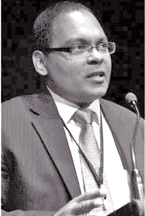‘Politics sans principles leads to division’
Priyan de Silva - Matara Sports Correspondent
Politics which has no principle causes division and disunity. A
university is not a place to engage in party politics that divides
everyone and limits progress. It is a place to develop understanding and
knowledge, engage in scholarship and serious debate, and solve common
problems affecting humanity, said Professor Rohan Gunerathne.

He was speaking at the Convocation of the University of Ruhuna under
the theme Meeting the challenges of the 21st century in Sri Lanka.
“Politics based on religion, ethnicity or ideology should have no
place in a university,” he said.
He said tax payers fund their hard earned money for free education,
hoping their investment will bring returns and create men and women
capable of governance.
At the heart of producing quality leaders is the need to enforce a
regime of responsibility at all levels, from banning ragging,
confrontational politics, work to rule and other activities disrupting
and degrading a university’s reputation and prestige. “It is not beyond
us to achieve this feat. Twenty years ago, I was so impressed by the
discipline and quality of the students at Sir John Kotalawala Defence
Academy that I donated my collection of books, papers and research files
to it,” Professor Gunerathne.
“I urge all Ruhuna graduates to be a model for other universities in
Sri Lanka by adhering to strict discipline and quality standards. Let
Ruhuna be the benchmark,” he said.
“Ancient Sri Lanka was renowned for social discipline. Ethics and
norms made Sri Lanka reach the pinnacle of civilization, producing the
best statesmen, engineers and scientists constructing the world’s
tallest brick structures, building multi- storey ships, making
unparalleled advances in irrigation and agriculture, Prof Gunerathne
pointed out.
Sri Lanka even served as a model for China when the fifth century
monk Faxian visited Sri Lanka to collect the Vinaya Pitaka, the Buddhist
text on discipline, he said.
He said research aspirations in Sri Lankan universities could not be
realized due to 30 years of terrorism. “You all belong to the i-generation.
Yet, the generation- long conflict in our country deprived you of
enjoying the i-generation’s benefits. Within four years of peace, Sri
Lanka has surpassed all other South Asian nations in growth. The dawn of
peace has given Sri Lanka the greatest of opportunities to leap into the
information age, he added.
He pointed out that Ruhuna has much promise and potential to
re-emerge as South Asia’s newest centre of learning and innovation. It
can propel Sri Lanka’s economy from agrarian to high tech, by
positioning itself as a foundation and fountain of knowledge. Located
strategically, the University of Ruhuna is unique with seven faculties
including Sri Lanka’s first Faculty of Fisheries and Marine Sciences
technology. With such foresight, Ruhuna can be the vanguard of change
not only for Sri Lanka but for the region, Prof Gunerathne said.
“To create a culture of interdisciplinary research and development,
the University of Ruhuna is an ideal venue to host an Institute of
Advanced Studies, where the best minds can be mobilized to solve the
nation’s problems,” he said.
A university should make every effort to visualize and prepare for
future scenarios. Hence, it is crucial to build national and
international partnerships with government and private sector industry.
In the 21st century pure research intuitions require adjustments in
order to become sustainable.
“We must not be typical academics by engaging in ivory tower
research. The general outlook of our university community is
conservative. Academics should think outside the box. To encourage and
incentivize creativity, appointments and promotions should be made on
merit, ability and performance. Seniority should be only one of many
criteria. This approach will accelerate innovation and dynamism,” the
professor added. In a rapidly changing world, Sri Lankan universities
should align themselves to producing the graduates that can meet the
nation’s demands from governance to entrepreneurship, science and
technology, he said.
The greatest flaw of our university system is its inability to keep
up with the nation’s emerging needs. In addition, the culture over time
that has developed among our students at universities has created an
attitude where there is an expectation for the state to provide not only
a free education, but a livelihood after as well. We must move away from
this attitude if we are to create a university system that can sustain
itself and meet students’ needs, he said.
One way is to begin a gradual move towards fee based postgraduate
education as well as better utilization of university staff to provide
training and education to the private sector.
Today, a disparity exists between the knowledge and abilities of
graduates produced and the skill required to serve government, the
private sector or join the self employed workforce, he pointed out.
|





